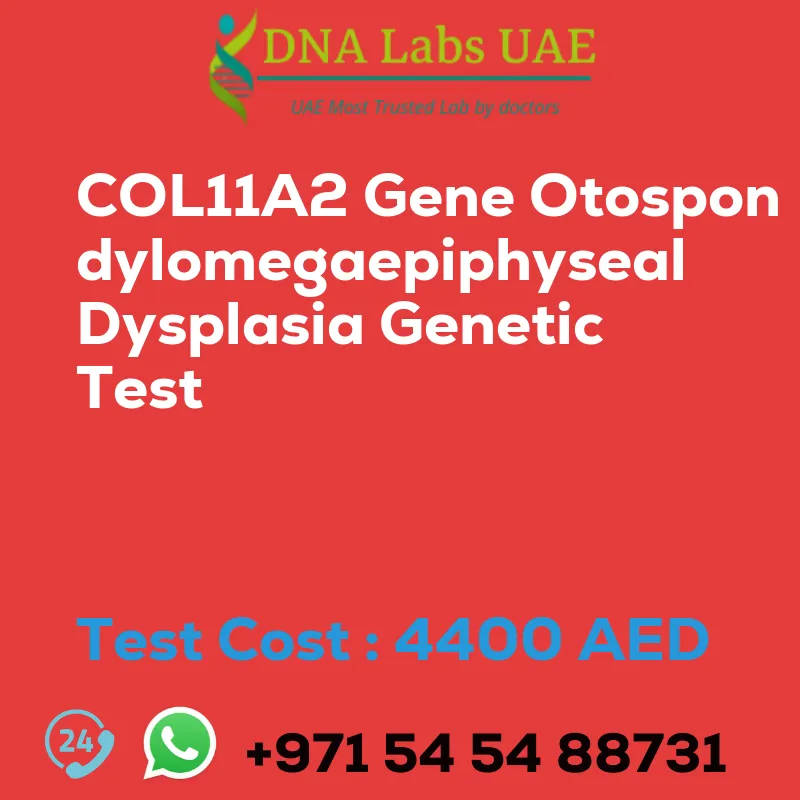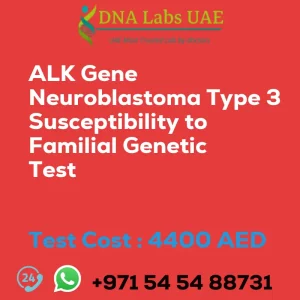COL11A2 Gene Otospondylomegaepiphyseal dysplasia Genetic Test
Are you or a loved one experiencing symptoms of Otospondylomegaepiphyseal dysplasia (OSMED)? DNA Labs UAE offers the COL11A2 Gene Otospondylomegaepiphyseal dysplasia Genetic Test to help diagnose and understand this rare genetic disorder.
Test Components and Price
The test is priced at 4400.0 AED and requires a blood sample, extracted DNA, or one drop of blood on an FTA card.
Report Delivery and Method
You can expect your test results within 3 to 4 weeks. The test utilizes NGS (Next-Generation Sequencing) technology.
Test Type and Doctor
The test falls under the category of Dysmorphology and is performed by our experienced team of pediatricians.
Test Department and Pre Test Information
The test is conducted in our Genetics department. Before undergoing the COL11A2 Gene Otospondylomegaepiphyseal dysplasia NGS Genetic DNA Test, we recommend providing a clinical history of the patient. Additionally, a genetic counseling session will be conducted to draw a pedigree chart of family members affected by COL11A2 Gene Otospondylomegaepiphyseal dysplasia.
Test Details
The COL11A2 gene plays a crucial role in producing type XI collagen, a protein found in the extracellular matrix. Otospondylomegaepiphyseal dysplasia is a rare genetic disorder that affects the development of the ears, spine, and joints. It is characterized by hearing loss, abnormal skeletal development, and joint problems.
NGS genetic testing, a cutting-edge technology, allows for the analysis of multiple genes or even the entire genome at once. This type of testing can detect various genetic variations, including small changes in the DNA sequence, deletions, duplications, and rearrangements. In the case of OSMED, the NGS genetic test for the COL11A2 gene involves sequencing the entire coding region of the gene to identify disease-causing mutations or variants. This helps confirm a diagnosis of OSMED and provides valuable information about the specific genetic changes associated with the condition.
Genetic testing is beneficial for individuals experiencing symptoms of OSMED. It offers a definitive diagnosis, aids in treatment decisions, and provides insight into the risk of passing the condition on to future generations. However, it’s important to consult with a healthcare professional or genetic counselor before deciding to undergo genetic testing, as it may not be available or necessary in all cases.
| Test Name | COL11A2 Gene Otospondylomegaepiphyseal dysplasia Genetic Test |
|---|---|
| Components | |
| Price | 4400.0 AED |
| Sample Condition | Blood or Extracted DNA or One drop Blood on FTA Card |
| Report Delivery | 3 to 4 Weeks |
| Method | NGS Technology |
| Test type | Dysmorphology |
| Doctor | Pediatrics |
| Test Department: | Genetics |
| Pre Test Information | Clinical History of Patient who is going for COL11A2 Gene Otospondylomegaepiphyseal dysplasia NGS Genetic DNA Test. A Genetic Counselling session to draw a pedigree chart of family members affected with COL11A2 Gene Otospondylomegaepiphyseal dysplasia NGS Genetic DNA Test gene COL11A2 |
| Test Details |
The COL11A2 gene is responsible for providing instructions for making a protein called type XI collagen. This protein is found in the extracellular matrix, which is a complex network of proteins and other molecules that provide structure and support to various tissues in the body. Otospondylomegaepiphyseal dysplasia (OSMED) is a rare genetic disorder that affects the development of the ears, spine, and joints. It is characterized by hearing loss, abnormal skeletal development, and joint problems. NGS (Next-Generation Sequencing) genetic testing is a type of genetic testing that uses advanced sequencing technologies to analyze multiple genes or even the entire genome at once. It allows for the detection of various genetic variations, including small changes in the DNA sequence, deletions, duplications, and rearrangements. In the context of OSMED, an NGS genetic test for the COL11A2 gene would involve sequencing the entire coding region of the gene to identify any potential disease-causing mutations or variants. This can help confirm a diagnosis of OSMED and provide information about the specific genetic changes involved in the condition. Genetic testing can be helpful for individuals with symptoms of OSMED, as it can provide a definitive diagnosis, inform treatment decisions, and help predict the risk of passing the condition on to future generations. However, it is important to note that genetic testing may not be available or necessary in all cases, and the decision to undergo testing should be made in consultation with a healthcare professional or genetic counselor. |








